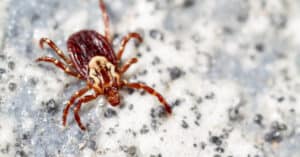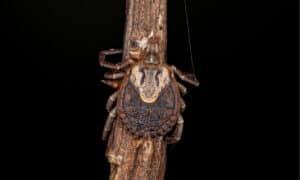Winter means fewer insects for you to deal with, unlike spring and summer. It is true that some insects hibernate during the colder months of the year, like flies and mosquitoes, however other insects don’t. It feels like the wintertime is the one time of the year that we can all let our guard down. After all, what crazy insects and bugs can actually survive the frigid cold? In fact, during the winter, many of us are happy to avoid ticks as it seems like the only time of year they aren’t around. However, some have wondered if ticks are capable of surviving cold weather.
So do you know if ticks die in the winter? Do these arachnids die or do they go somewhere else? You’ll find out about all of that and more in this article!
Do Ticks Die in the Winter?
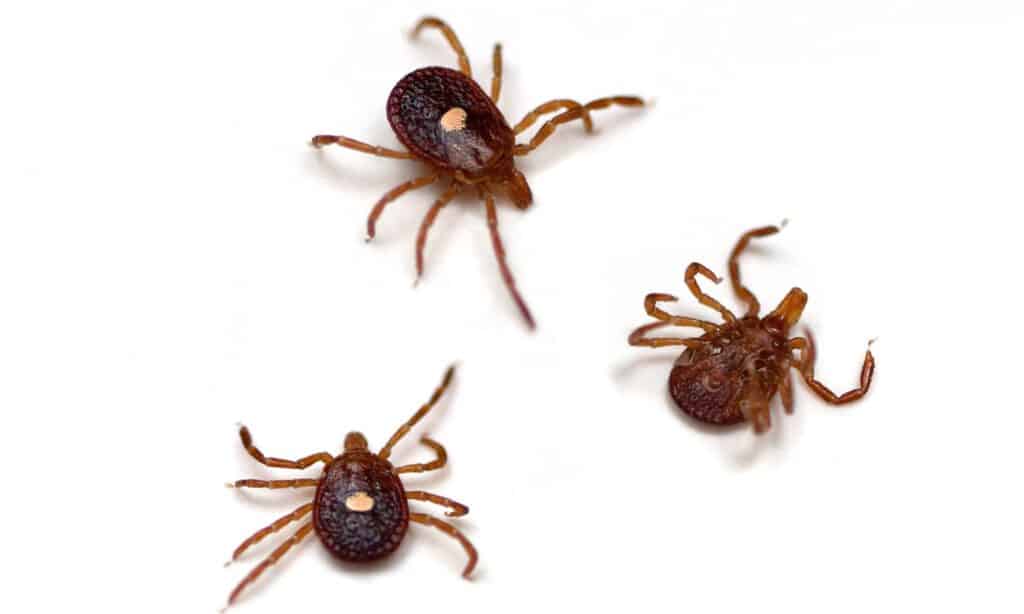
The winter doesn’t mean ticks disappear just because it’s cold. There are a variety of methods by which they survive.
©iStock.com/epantha
During the winter, what is the tick’s survival rate? That’s the question on everyone’s mind. It is well known that not many insects are active during the wintertime. In fact, adult insects often hibernate during the winter months. This is why many of us believe that ticks also either hibernate or die in the wintertime. However, ticks do not actually die in the winter. In fact, they don’t even hibernate either. It is only at temperatures colder than 45 degrees Fahrenheit that ticks become dormant.
However, this doesn’t mean that ticks are totally invincible during the cold weather months. Ticks can actually die when the temperature drops super low. Laboratory studies conducted by the Pennsylvania Department of Conservation & Natural Resources indicate that ticks die between -2 and 14 °F. However, due to a large number of variables in the wild, only about 20% of the population dies each winter. It is actually during winters with a wide range of temperatures that ticks are at their most vulnerable. They might come out on warm days during the winter, but a sudden drop in temperature could kill them faster than they’d normally die.
So how do ticks happen to survive during the cold winter months? Let’s find out.
How Do Ticks Survive the Winter Months?
What do ticks do in winter? How do they survive in the coldest months? After all, they are tiny arachnids with no actual covering to keep them warm. As the weather gets colder, ticks tend to burrow beneath leaves and plant material that then acts as insulation. There is also evidence that deep snow can help shield ticks from freezing temperatures when they are dormant. During diapause, which is a type of hibernation, ticks lose moisture from their bodies, creating a natural antifreeze known as a cryoprotectant, which reduces their freezing point. Additionally, ticks can survive harsh winters if they latch on to animals that provide them with warmth and food.
As you can see, there are several ways in which a tick can survive during the harsh winter months. It seems that cold weather doesn’t particularly phase them as long as the temperatures don’t drop too harshly. In the winter, ticks can only die if they are caught off guard by a sudden drop in temperature after coming out during a warm day.
Winter Tick Activity: Which Types Are Most Active?
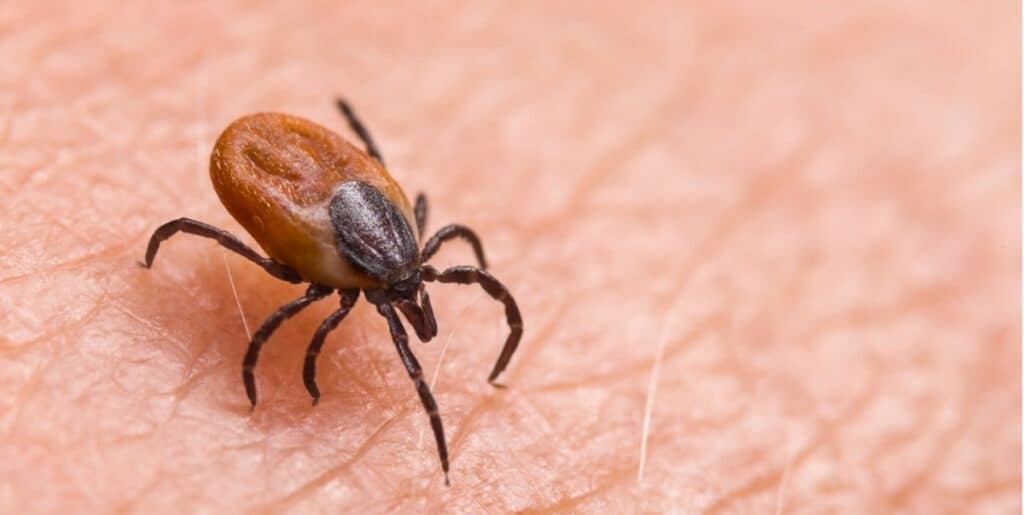
Deer ticks are able to survive and be active during the wintertime.
©iStock.com/Ladislav Kubeš
There are only a few tick species that are active in the winter. The black-legged tick, aka deer tick, and its western cousin, the western black-legged tick, are among these. It has been shown that both species can carry Lyme disease, as well as other diseases, and are more active in cold weather. In cold weather, these ticks are active when the first frost hits, but they go dormant when the temperatures fall below freezing.
Due to its lifelong attachment to warm-blooded hosts, the winter tick is active throughout the year — something rare for ticks.
There are a number of ticks that are common during the winter, such as dog ticks and lone star ticks, that seek shelter in leaf litter during the colder months and go dormant (in diapause) during the winter. Snow can provide additional insulation for them, which further protects their bodies from the cold if they are fortunate enough to find a thick blanket of snow to cover their bodies. In the springtime, when the temperature reaches around 45 degrees during the daytime, these ticks emerge again and become active.
Where Do Ticks Live?
Ticks typically live in grassy or wooded areas but may infest your yard as well. The danger of tick bites increases when ticks infest your yard, particularly if you have pets or children. As humans or animals pass by their spot in the grass, they grab onto hairs or clothing before crawling gently to moist, dark, or hairy areas on your body.
The odor of breath, body odors, and vibrations emanating from their hosts can be picked up by the ticks. It seems that as soon as a host comes near, it prepares itself by extending one or two pairs of legs and it is ready to reach out and grab onto it.
Despite their inability to jump or fly, they are highly adept at hitchhiking. Their mouthparts are the only parts of their body that enter the skin. During the piercing of their sharp mouth into the skin, their saliva contains a mild anesthetic which makes it impossible for the host to feel the piercing of their mouth.
After this, it is possible for the tick to drink blood unhindered until the host becomes aware that it is present. It is not uncommon for ticks to live most of their lives going from one host to another in humid and moist environments. They only really leave their host to molt or reproduce.
What You Can Do to Avoid Ticks
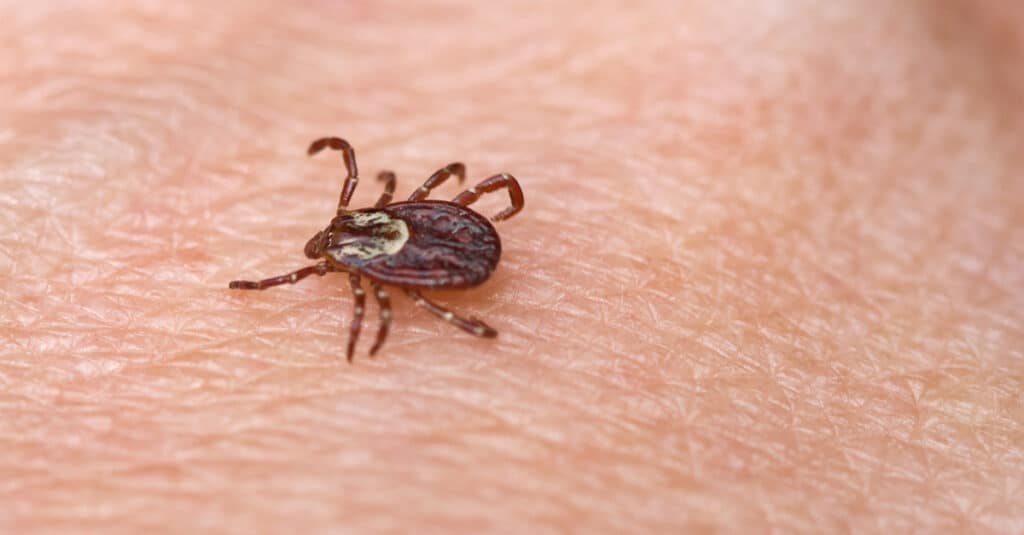
The best way to prevent Lyme disease, Rocky Mountain spotted fever, and other tickborne diseases is to reduce your exposure to ticks.
©Melinda Fawver/Shutterstock.com
Ticks can bite anyone, regardless of how often they go outdoors. Pets can carry ticks in their fur, which means you can pick up ticks from them. If you have leaf piles in your backyard, ticks may choose to stay dormant in those piles as well. Maintaining a clean yard will decrease the chances of ticks becoming a nuisance in your home. A tick is likely to hide in an area where there are a lot of weeds, leaves, or brush.
Ensure that your yard is deer-proof by discouraging deer from entering. Ticks are primarily carried by deer, so you don’t want them in your yard. Whenever you head out hiking, wear light-colored clothing and tuck your sock legs into your pant legs. You should always check yourself, your pets, and your children for ticks after being outdoors for a while. Especially in heavily-wooded areas.
Are There Any Tick Repellents or Sprays That Work Best?
In accordance with the CDC, the best tick repellents contain at least 20% DEET, picaridin, or IR3535 (short for Insect Repellent 3535). The product should be applied to the skin or clothing while avoiding contacting the eyes, mouth, or hands.
Additionally, you may wish to use products containing permethrin, which can be sprayed directly on clothing, boots, tents, or other camping gear. As a general rule, this should be applied whenever you have the intention of spending time outdoors, particularly in wooded areas, after walking through tall grass, or while maintaining the garden.
As far as tick repellents are concerned, there are many excellent brands available on the market. The important thing to look at is the back of the package, where you will find the ingredients and the percentage of each ingredient that is active. Tick repellents that consist primarily of water or fragrance are not effective. Insect and tick repellent usually doesn’t smell good, but it serves its purpose, which is to protect you from harmful diseases caused by ticks.
Up Next:
The photo featured at the top of this post is © Evgeniyqw/Shutterstock.com
Thank you for reading! Have some feedback for us? Contact the AZ Animals editorial team.




